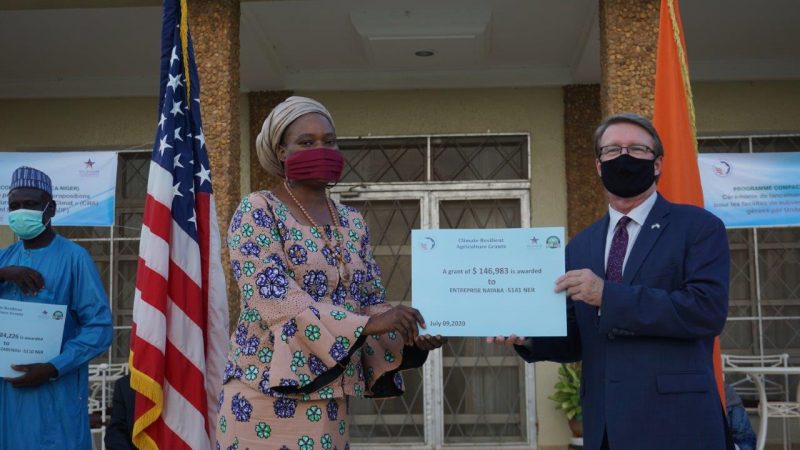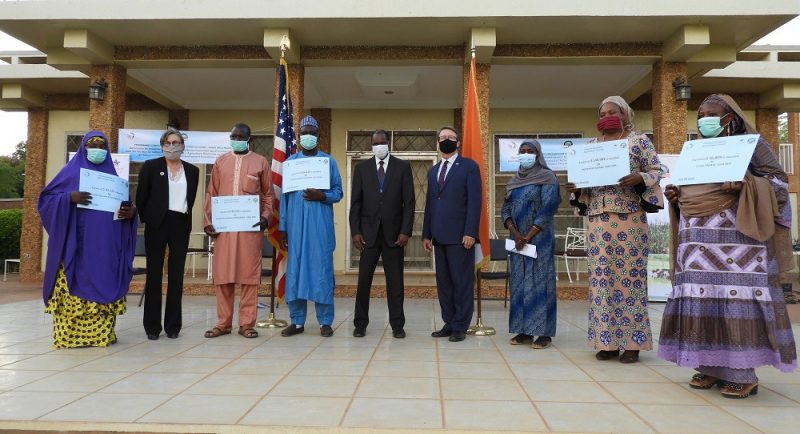
A recipient of MCC’s Niger agriculture grant receives her award at a ceremony with the U.S. Ambassador in Niamey. The grants will help recipients—mainly women- or youth-led groups—to strengthen and develop their businesses and will improve irrigation and agricultural production.
Grants to help women and youth
Women in Niger face economic challenges often because of gender restrictive cultural practices and lack of education—only 54 percent of female primary school students reach the sixth grade. Agriculture is no exception—systemic gender inequalities in the sector give rise to particular challenges for women, such as lack of access to agricultural inputs. This, in turn, curbs women’s ability to boost their livelihoods and invest in their communities.MCC’s Niger Compact includes a specific focus on empowering entrepreneurs and small business groups and is working on unlocking the potential of true market growth and poverty reduction. This starts with women and youth. Under the Climate-Resilient Communities Project, a grant facility was established to help increase agricultural productivity and farm incomes for producer/processor groups, women’s and youth groups, and micro-, small-, medium-, and large-sized enterprises.
A portion of the grants are managed in partnership with the United States African Development Foundation (USADF); and support five categories of project activities for funding: irrigation and irrigated agricultural production (including post-harvest and storage); rain-fed production (including post-harvest and storage); livestock integration; agro-processing and sales; and input supply.
Between October 2019 and March 2020, $2.3 million in grants were awarded to 25 Nigerien producer/processor groups and micro-, small- and medium-sized enterprises, 13 of which were women or youth groups. In total, it is anticipated that up to 65 grant agreements will be signed over two rounds. On July 9, 2020, an awards ceremony was held in Niamey with the U.S. Ambassador to Niger, Eric Whitaker, to celebrate the first round of grant awards. Read more about three of these women-managed enterprises that were selected to receive a grant.
The peanut oil company Nayaba is a trade platform for peanut oil produced by rural women, helping them transition into a formal industry by providing support in product marketing and distribution. The company also buys peanuts directly from women producers in the regions of Dosso and Maradi and processes the peanuts into marketable oil at its own production facility. The grant that Nayaba received aims to increase the quantity and quality of peanut products by procuring more modern agricultural processing equipment and storage infrastructure, while also building management capacities. Mrs. Rabi, the Director of Nayaba, was present at the July 9 ceremony, and reported that “Thanks to the MCC’s grant, I am seeing things bigger… having a modern processing unit will improve the peanut value chain and help develop an even more inclusive market.”
The Societe Coopérative Anfani de Koulikoira was established in 2007 and comprises a group of 40 women paddy rice processors. Women purchase paddy rice from members and other producers to process for added value and then sell in local markets and in the capital, Niamey. The grant aims to increase the cooperative’s production capacity and the quality of finished products by creating a dedicated production space and acquiring equipment including a mini rice mill.
The Wafakay women’s group is a cooperative that was formed in 2009 and consists of 30 members who process rice. With the grant, the cooperative will train members in improved rice processing techniques, increase its processing capacity with new equipment and a larger drying area, and install a solar heating kit for parboiling operations to reduce processing costs. Members will also help rice producers increase their production, thereby helping to create a reliable source of rice for the cooperative.

Recipients of MCC’s Niger agriculture grant attend the awards ceremony with the U.S. Ambassador in Niamey. Grants will help the recipients—mainly women- or youth-led groups —to strengthen and develop their businesses, improving irrigation and agricultural production.

